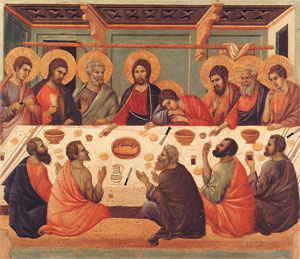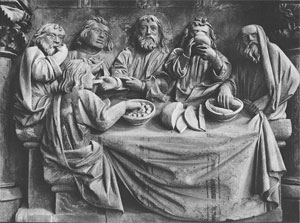Keeping Promises
Corpus Christi (Body and Blood of Christ)
Guest essay by Don Thorsen, Professor of Theology at Azusa Pacific University.
For Sunday June 18, 2006
Lectionary Readings (Revised Common Lectionary, Year B) hotlink: )
Exodus 24:3–8
Psalm 116
Hebrews 9:11–15
Mark 14:12–16, 22–26
 |
Father and son. |
When I was a child, I could always count on my parents to keep their promises. They didn’t always make promises, of course. But when promises were made, I could count on my mom and dad to be true to their words.
One Sunday morning, my dad promised to play catch with me after church. However, before church started, I answered the telephone, which I wasn’t supposed to do on Sunday mornings. You see, my dad was the owner of a plumbing business, and he often received calls for plumbing emergencies at home. Since he didn’t want church disrupted, he didn’t want us to answer the phone on Sunday mornings. I probably answered the phone by mistake, since I was—after all—just a kid. But because there was a plumbing emergency, my dad felt obliged to go out, and his work took up much of the day. When he finally came home, I asked if he wanted to play catch as I thought he had promised. However, he said he couldn’t because I had answered the phone that morning, and he wasn’t free to play.
Promises and Children
I’ve often thought it odd that I should remember that little event for so long. I could say, of course, that it was unfair of my dad to blame me—a kid—for answering the phone. Maybe it was unjust; maybe it was not. However, that’s not the point of my story. I never held it against my dad because, frankly, I can’t remember another incident throughout my childhood or adulthood when my father broke a promise. In fact, now that I have children, I can easily understand how life’s circumstances can get in the way of fulfilling promises to them. There have actually been times when I—as a parent—have wept over not being able to keep the simplest of promises to my children. When you love your children, you want to do all you can to keep your promises, even the seemingly least important or hastily made ones.
Although circumstances beyond our control may get in the way, we need to be as responsible as we can—with God’s grace—in keeping our promises, because God as well as others are counting on us to be true to our words. Scripture tells us much about the importance and blessings of keeping promises.
Covenantal Promises
 |
Moses. |
In scripture, God made promises, and—so far as we know—God has always kept them. In Exodus 24:3–8, we read about the covenant God made with the people of Israel. Moses mediated the covenant between God and them (24:3). After the Israelites accepted the covenant, Moses sprinkled blood on them (24:8). The ritual represents the ancient view that blood was efficacious in establishing community between God and the Israelites.
The people of Israel believed in the steadfast love of God in keeping covenantal promises made to them. Psalm 116 represents a thanksgiving for healing, particularly for divine healing. In gratitude to God, the psalmist asks what should be done. The response is, “I will pay my vows to the Lord in the presence of all his people” (116:14, NRSV). Keeping vows (or promises) to God and to others is the proper response to the loving steadfastness of God in graciously meeting our needs spiritually as well as in other ways.
New Covenantal Promises
God’s covenantal relationship with people continued and was renewed through the establishment of a new covenant with all people. In Hebrews, Jesus is depicted as both the mediator and sacrificial victim on behalf of people (Hebrews 9:11–15). Through his life, death and resurrection, Jesus made a blood offering incomparably superior to the sacrifices of old. In so doing, he inaugurated a new covenantal relationship between God and people (9:15). By grace through faith, people may be redeemed for eternal life and renewed in the image of God.
Jesus instituted a new ritual, representative of how his blood continues to be efficacious in establishing community between God and people. In Mark 14:22–26, we read of Jesus blessing and giving thanks for the bread and wine. He said, “Take; this is my body” (14:22), and “This is my blood of the covenant, which is poured out for many” (14:24). In churches today, we continue this ritualistic remembrance of the divine promises of salvation and empowerment for Christian living. Like the Psalmist asked, what should be our response?
Promise Keepers
 |
Jesus at the Lord's Supper. |
The responses Christians most often give to the graciousness of God are those of faith, hope and love. Christians have faith and hope in God, and they also love God. Loving God implies loving others (Galatians 5:14). Loving others implies keeping promises we make to them as well as to God. It also involves keeping promises we make to ourselves, since we are to love others as we love ourselves. We don’t love others well if we don’t love ourselves as God wants us to do.
Keeping the promise of loving others may be one of the most important as well as satisfying ways of responding to all that God has done for us. Loving others, of course, involves more than loving individuals around us. It involves loving an expanding number of neighbors—locally, nationally, and internationally. God does not want our love to be limited.
How Shall We Then Live?
Christians are to be concerned about people’s spiritual well-being; they are also to be concerned with their health, social, economic, and political well-being. This is a complex feat and not easily accomplished. Yet, just as God keeps promises that are far-reaching, Christians need to be far-reaching in keeping promises to love their neighbors. They should love just as they would like to be loved in the fullness of God’s intended blessings for them and the environment in which they live.
 |
The Lord's Supper. |
Are there promises you’ve made that you have not kept? to God? to yourself? to others? to others abroad? to society? to the environment? Now, I don’t want to advocate legalism; not all promises are of the same importance. I break many promises to myself for which I do not need to make amends. However, there are promises I need to take more seriously in terms of loving as I should. By the grace of God, we need to be courageous in keeping our promises, just as God keeps promises to us.
For further reflection:
* What has been your experience of promise-making and promise-keeping with God? Your own self? Others?
* What are the consequences of making, breaking, or keeping promises?
* Consider what a friend of mine once said about his marriage promise: "I'm not a quitter."
* Are there promises you need to renew?





